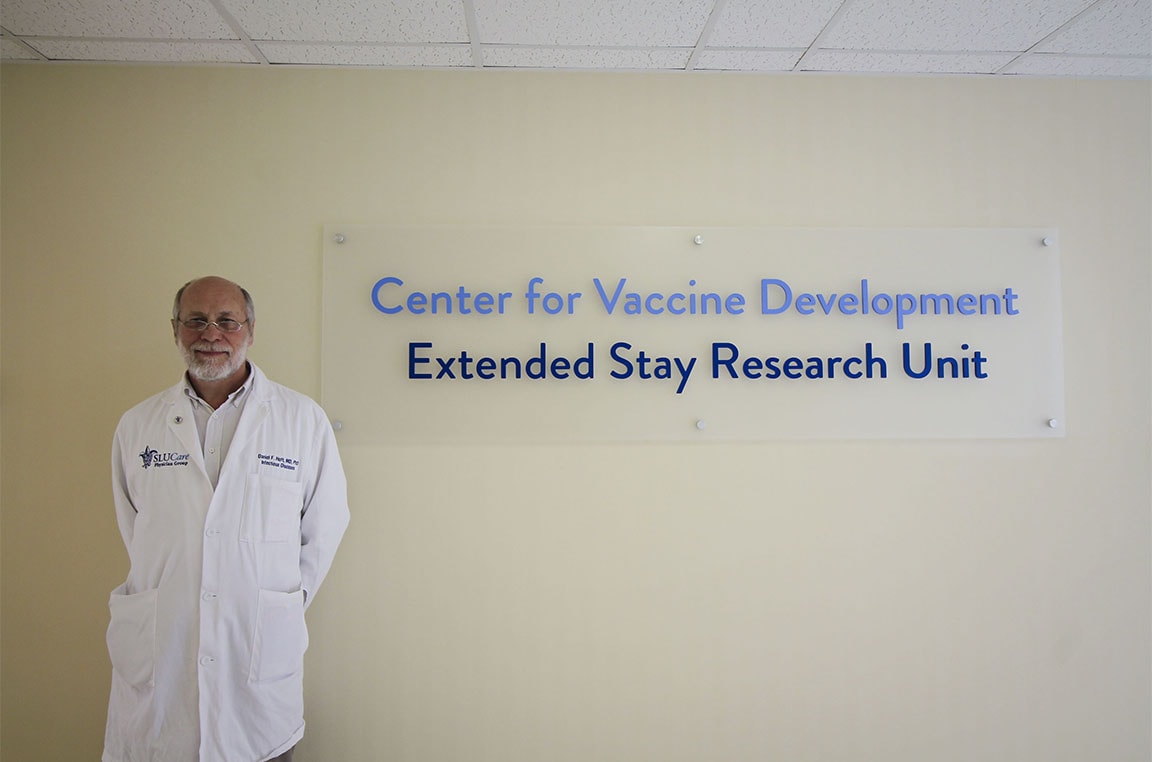Welcome to Hotel Influenza
Saint Louis University has converted part of its former hotel in the Salus Center into a 24-room research suite to house volunteers who will be intentionally exposed to influenza to see if investigational vaccines keep them from getting sick.
The Extended Stay Research Unit will allow SLU to take its vaccine research to the next level, said Daniel Hoft, M.D., Ph.D., director of SLU’s Center for Vaccine Development.
SLU is funded by the National Institute of Allergy and Infectious Diseases, which is part of the National Institutes of Health, as one of nine Vaccine and Treatment Evaluation Units that study vaccines to protect against infectious diseases and emerging infections.
“SLU has invested in this because it is an important way to potentially contribute significantly to the development of a universal flu vaccine,” said Hoft, who also is director of infectious diseases, allergy and immunology at SLU.
Intentional Flu Exposure
The facility allows SLU to conduct human challenge influenza studies, which differ from the more common flu vaccine clinical trials historically done at SLU.
“Human challenge studies are a way to get a lot of information quicker, with a smaller number of volunteers and less cost than a traditional vaccine study,” Hoft said.
“In a traditional flu study, we vaccinate people and see if their immune systems respond by creating antibodies that fight flu. In a human challenge study, we vaccinate people, then deliberately challenge their bodies by exposing them to flu to see if they get sick.”
A human challenge study typically is conducted early in vaccine research, after an initial Phase 1 study assesses if a vaccine is safe when given to a small group of healthy adults.
How Challenge Studies Work
Human challenge study volunteers are given a vaccine or placebo, then intentionally exposed to a strain of the influenza virus. Volunteers are quarantined in SLU’s challenge unit for about 10 days.
During that time, they are observed and have blood and lung tests and nose swabs to see if they are infected with flu and shedding the virus, which means the virus is present in mucus and other body secretions and can be transmitted to others. They are not allowed to go home until tests show they are negative for infection for two days.
“You know when they’re exposed to the flu, so can plan exactly when to study it. You are not waiting for nature to take its course. If a challenge trial shows the vaccine protected a small group of volunteers against flu, you can be much more confident the vaccine is more likely to be worth the hundreds of millions of dollars of investment to go through phase 3 development,” Hoft said.
Volunteers for human challenge studies typically receive compensation of about $3,500 for their time and travel. Nurses are in the unit around the clock to monitor and care for them.
The Accommodations
The Extended Stay Research Unit has the trappings of a staycation for those willing to risk getting the flu. Everyone who participates in a human challenge flu study is quarantined in the unit because it takes time for symptoms to develop and the contagious period to end. Those who don’t get sick and are not shedding the challenge virus will be able to leave a little earlier than those who are infected.
The facility can accommodate as many as 24 study volunteers in hotel-style rooms that are equipped with private bathrooms, TV and internet.
Common areas with comfy chairs offer spaces to socialize, read or watch TV with picture-window views of the Arch. Catered meals are served in the dining room/kitchen area, and there is exercise equipment for a quick workout.
The in-patient challenge unit has been carefully designed to protect the safety of study volunteers and non-study participants in the building. The facility is separated from offices in the rest of the building by double-door entrances that create negative pressure. It has a sophisticated HVAC system for aerosol containment because recent animal data has demonstrated flu can be transmitted through tiny droplets in the air.
“For research purposes, we need strong infection control, including upgraded air filtration systems and N95 masks that fit closely to the face and filter airborne particles,” Hoft said
There is a “clean room” with work spaces for non-volunteers who come and go into the unit, and a changing area where nurses and doctors don or remove personal protective equipment (PPE) that they wear whenever interacting with volunteers who might be infected with flu.
The Future of Research
Hoft said the new research facility is ideal to conduct research for a universal influenza vaccine, which is one of the federal government’s priorities. Currently, vaccines are engineered to protect against only the strain of flu that researchers predict will be circulating each year. That means new vaccinations are needed annually, and sometimes those vaccines don’t work if flu predictions are off.
A universal flu vaccine would protect people from many strains of flu, including pandemics.
“We can give people a vaccine and challenge them with more than one virus, maybe at different times, to quickly access the actual breadth of protection against different strains of flu,” Hoft said. “This is important because no one vaccine currently protects against all strains of influenza, which changes year to year.”
In addition to testing flu vaccines, Hoft said the new Extended Stay Research Unit can be used to develop vaccines for other illnesses, such as RSV (respiratory syncytial virus), a sickness that can cause breathing problems and be deadly for babies.
He also believes the research unit holds potential for drug development: challenge a volunteer with an illness, then see if an investigational drug works as a therapy.
Hoft said the Extended Stay Research Unit likely will conduct a small pilot study with an industry sponsor sometime within the next six months.
Contact and Additional Information
To learn more about all of the vaccine research being conducted at Saint Louis University, visit vaccine.slu.edu, call 314-977-6333 or email vaccine@health.slu.edu.
Established in 1836, Saint Louis University School of Medicine has the distinction of awarding the first medical degree west of the Mississippi River. The school educates physicians and biomedical scientists, conducts medical research, and provides health care on a local, national and international level. Research at the school seeks new cures and treatments in five key areas: infectious disease, liver disease, cancer, heart/lung disease, and aging and brain disorders.



















